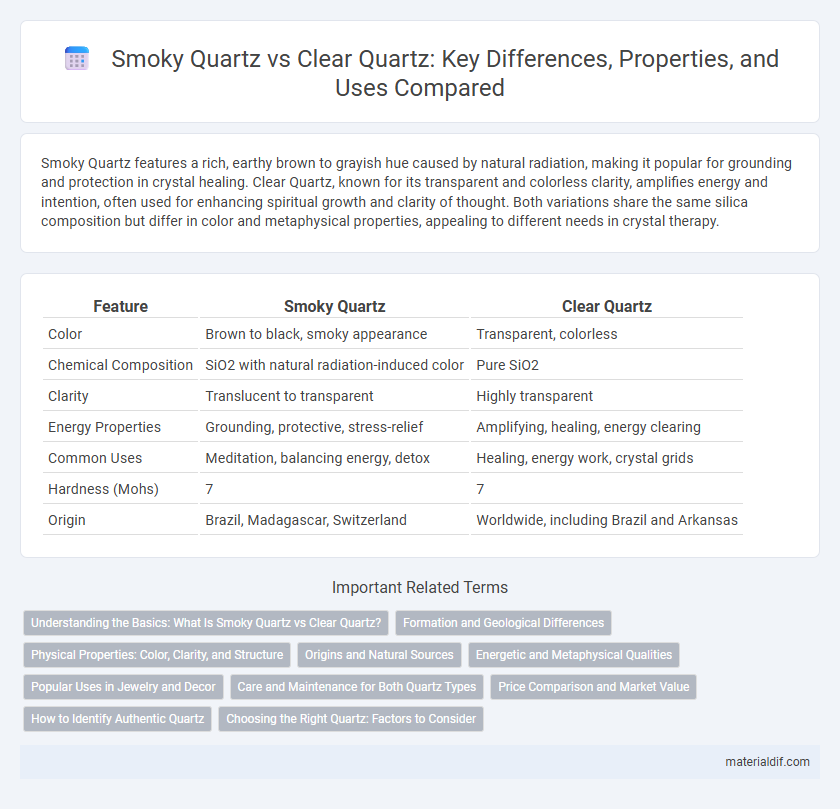Smoky Quartz features a rich, earthy brown to grayish hue caused by natural radiation, making it popular for grounding and protection in crystal healing. Clear Quartz, known for its transparent and colorless clarity, amplifies energy and intention, often used for enhancing spiritual growth and clarity of thought. Both variations share the same silica composition but differ in color and metaphysical properties, appealing to different needs in crystal therapy.
Table of Comparison
| Feature | Smoky Quartz | Clear Quartz |
|---|---|---|
| Color | Brown to black, smoky appearance | Transparent, colorless |
| Chemical Composition | SiO2 with natural radiation-induced color | Pure SiO2 |
| Clarity | Translucent to transparent | Highly transparent |
| Energy Properties | Grounding, protective, stress-relief | Amplifying, healing, energy clearing |
| Common Uses | Meditation, balancing energy, detox | Healing, energy work, crystal grids |
| Hardness (Mohs) | 7 | 7 |
| Origin | Brazil, Madagascar, Switzerland | Worldwide, including Brazil and Arkansas |
Understanding the Basics: What Is Smoky Quartz vs Clear Quartz?
Smoky Quartz is a variety of quartz crystal characterized by its brown to black or gray coloration caused by natural radiation exposure, whereas Clear Quartz is transparent and colorless, prized for its clarity and versatility. Both minerals share the same chemical composition of silicon dioxide (SiO2) but differ primarily in their impurity content and formation conditions, which influence their appearance and metaphysical properties. Understanding these basic distinctions helps in identifying their uses in jewelry, healing, and energy work.
Formation and Geological Differences
Smoky Quartz forms when natural radiation interacts with trace aluminum impurities within the crystal lattice, giving it a characteristic brown to black coloration, whereas Clear Quartz remains pure silicon dioxide without significant exposure to radiation or impurities. Smoky Quartz typically originates in granitic pegmatites and high-temperature hydrothermal veins, while Clear Quartz is commonly found in a broad range of geological environments including igneous, metamorphic, and sedimentary rocks. The key geological difference lies in the presence of ionizing radiation and aluminum substitution, which affects the crystal's color and formation conditions.
Physical Properties: Color, Clarity, and Structure
Smoky quartz exhibits a range of colors from light gray to deep brown or black due to natural irradiation, while clear quartz remains colorless and transparent. Clarity varies as smoky quartz often contains inclusions and cloudiness, contrasting with the typically high clarity of clear quartz crystals. Both minerals share a hexagonal crystal structure, but the color variation in smoky quartz results from aluminum impurities and exposure to radiation within the crystal lattice.
Origins and Natural Sources
Smoky Quartz primarily originates from granitic pegmatites and metamorphic rocks found in regions such as the Swiss Alps, Brazil, and Colorado, where natural radiation causes its distinctive smoky color. Clear Quartz is abundant worldwide, especially in Brazil, Arkansas (USA), and Madagascar, forming in hydrothermal veins and igneous rocks with minimal impurities. Both varieties crystallize from silicon dioxide, but their origins influence their clarity and coloration, with Clear Quartz maintaining transparency and Smoky Quartz exhibiting hues from light gray to deep brown.
Energetic and Metaphysical Qualities
Smoky Quartz exhibits grounding and protective energetic qualities, effectively absorbing negative energy and promoting emotional calmness, making it ideal for stress relief and spiritual detoxification. Clear Quartz amplifies energy and intention, enhancing clarity, spiritual growth, and healing through its powerful ability to magnify vibrations and energy fields. Both crystals support metaphysical practices, with Smoky Quartz fostering stability and Clear Quartz driving manifestation and channeling higher consciousness.
Popular Uses in Jewelry and Decor
Smoky Quartz is prized in jewelry for its rich, earthy tones that complement silver and gold settings, offering a sophisticated, grounded aesthetic popular in rings and pendants. Clear Quartz is highly versatile and widely used in both jewelry and decor for its pure, transparent appearance that enhances light reflection and pairs well with various design styles. In home decor, Smoky Quartz serves as a striking centerpiece or natural accent stone, while Clear Quartz is favored for its ability to amplify energy and brighten spaces.
Care and Maintenance for Both Quartz Types
Smoky quartz and clear quartz require gentle cleaning with lukewarm water and mild soap to maintain their clarity and energy. Avoid prolonged exposure to direct sunlight for smoky quartz as it can fade its distinctive smoky hue, while clear quartz is more resistant to light damage. Both types benefit from periodic cleansing with natural methods like moonlight or sage smoke to remove energetic impurities without scratching their surface.
Price Comparison and Market Value
Smoky quartz generally commands a higher price in the market due to its unique coloration and relative rarity compared to clear quartz, which is more abundant and widely available. While clear quartz prices range from $1 to $5 per carat, smoky quartz can fetch prices between $3 and $15 per carat depending on clarity and origin. Market value for both types fluctuates based on demand, but smoky quartz retains better value in the collector's and jewelry markets due to its distinct smoky hue and perceived metaphysical properties.
How to Identify Authentic Quartz
Authentic smoky quartz displays a translucent brown to gray hue caused by natural irradiation, while clear quartz is colorless and transparent with no internal cloudiness. Genuine quartz crystals have a hexagonal crystal system and often show natural imperfections or inclusions that distinguish them from synthetic or glass imitations. Testing hardness, as quartz ranks 7 on the Mohs scale, ensures authenticity since it resists scratching from materials with lower hardness values.
Choosing the Right Quartz: Factors to Consider
Choosing between Smoky Quartz and Clear Quartz depends on factors such as energy preference, healing properties, and aesthetic appeal. Smoky Quartz is known for grounding energy and protection against negativity, while Clear Quartz amplifies energy and enhances clarity. Consider your desired metaphysical benefits and visual style to select the ideal quartz for meditation or decoration.
Smoky Quartz vs Clear Quartz Infographic

 materialdif.com
materialdif.com